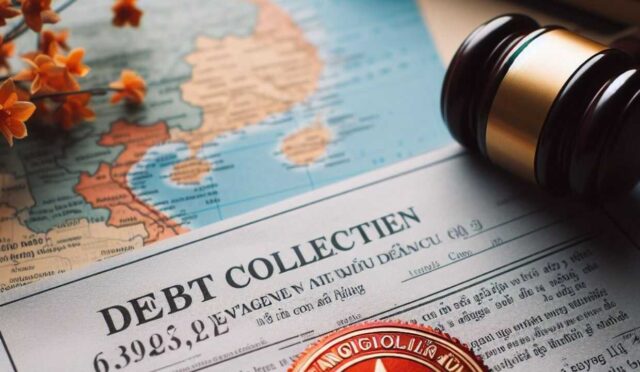During the course and development of any enterprise, encountering bad debts is an inevitable challenge. However, the reality of debt collection practices in Vietnam reveals various difficulties and inefficiencies.
While businesses seek more efficient strategies, the current debt collection practices in Vietnam are riddled with legal complications and inadequacies. It’s crucial for businesses to find effective solutions for rapid and complete debt recovery to maintain financial stability and revenue.
In Vietnam, navigating through the legal maze of debt collection practices involves two key stages.

First Stage of Debt Collection Practices in Vietnam
The first stage, as dictated by debt collection practices in Vietnam, is the lawsuit phase in Court. When a debtor exhibits non-cooperation or infringes upon a business’s interests, the affected enterprise can initiate a lawsuit in a competent court. This traditional legal route compels businesses to adhere to stringent court procedures and relevant legal norms.
Specific lawsuit prerequisites must be met in the context of debt collection practices in Vietnam:
– The emergence of a debt and the debtor’s failure to repay, leading to a dispute where the business’s rights are perceived as violated.
– The dispute falls within the Court’s jurisdiction, excluding any other agency or organization, like Arbitration.
– Completion of pre-litigation procedures, such as mediation or notification, as mandated by agreements or law.
Moreover, as part of the debt collection practices in Vietnam, businesses must attach substantiating documents, like invoices and loan agreements, to their lawsuit petitions. These are crucial for validating the lawsuit and preventing time wastage due to procedural errors.
Upon acceptance of the petition and payment of court fees, the Court embarks on evidence collection and verification, holding meetings, and attempting conciliation.
If reconciliation fails, the court proceeds to trial. Here, the business’s considerations of late payment interest, principal debt, and the debtor’s financial capacity are crucial for the Court’s decision, aligning with debt collection practices in Vietnam.
Second Stage of Debt Collection Practices in Vietnam
The second stage in the debt collection practices in Vietnam involves requesting judgment enforcement. Post-trial, when the court’s decision is legally binding, all parties, especially debtors, must comply.
As part of the debt collection practices in Vietnam, businesses have a five-year window from the judgment’s effective date to request enforcement from the district-level judgment enforcement agency.
This phase of debt collection practices in Vietnam requires businesses to prepare a detailed enforcement request, including the judgment, decision, and relevant documentation.
A key aspect of debt collection practices in Vietnam is the ability of businesses to request enforcement agencies to apply asset preservation measures. These include freezing accounts, seizing assets, and suspending asset transfers to prevent debt evasion.
In line with debt collection practices in Vietnam, the enforcement agency notifies the debtor, setting a voluntary compliance period. If the debtor fails to comply, enforcement is implemented. Monetary assets are recovered through various means, such as account deductions or asset sales, as part of the debt collection practices in Vietnam.
Challenges in Debt Collection Practices in Vietnam
Despite legal provisions, the actual implementation of debt collection practices in Vietnam often faces hurdles. Difficulties in locating debtors, absent trial procedures, and lengthy evidence collection processes are just some of the challenges. These issues, intrinsic to debt collection practices in Vietnam, delay litigation and affect businesses adversely.
Moreover, the enforcement phase in debt collection practices in Vietnam can be prolonged due to poor coordination among banks, organizations, and enforcement agencies. The auctioning of complex assets also contributes to delays in the debt recovery process, a critical aspect of debt collection practices in Vietnam.
Subjective factors, such as non-cooperation in asset handling and violations by enforcement officers, further complicate the debt collection practices in Vietnam. As there is no set timeline for resolving debt disputes, the efficiency of debt recovery varies.
In conclusion, businesses aiming for effective debt recovery in Vietnam must proactively gather debtor information and understand judgment enforcement conditions. Consulting legal experts in Vietnam is advisable to navigate the intricate debt collection practices in Vietnam and safeguard their rights.
About ANT Lawyers, a law firm in Vietnam
We help clients overcome cultural barriers and achieve their strategic and financial outcomes, while ensuring the best interest rate protection, risk mitigation and regulatory compliance. ANT lawyers has lawyers in Ho Chi Minh city, Hanoi, and Danang, and will help customers in doing business in Vietnam.


Không có nhận xét nào:
Đăng nhận xét